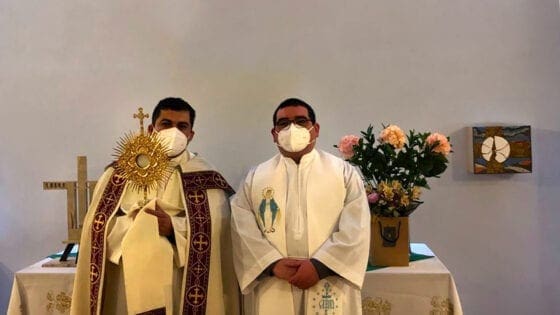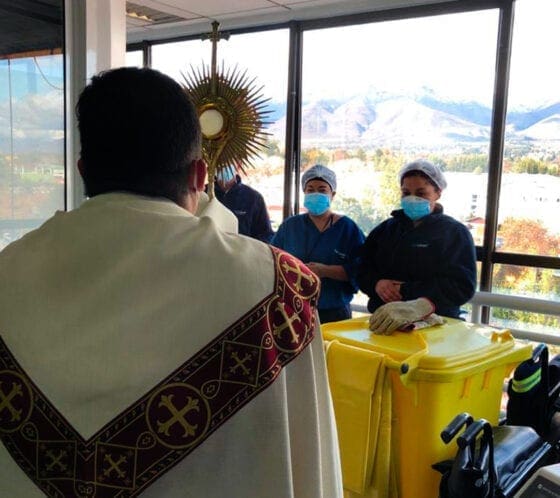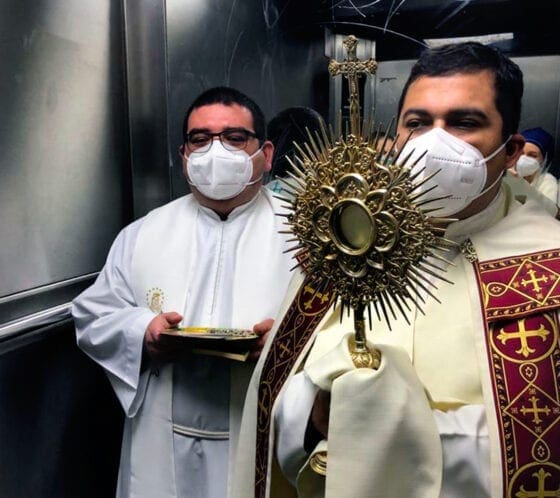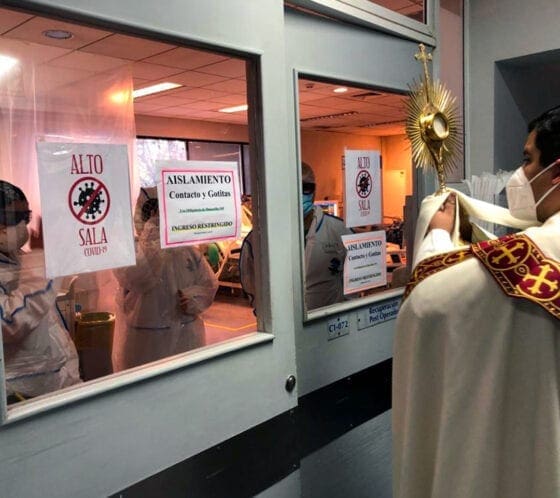 The time of the pandemic has been a time of trial and desolation, a time of suffering and of the presence of pain in the lives of many people, for many families throughout the world, due to the large number of infected and deceased people in so many places. At the beginning of the pandemic, we learned that the Coronavirus was a highly contagious and fast-spreading virus that does not discriminate against anyone, and that it can spread in the places that one least expects. This historic moment that has marked us all, especially in this year of 2020, and the Congregation has not been exempt from it. The modification of our activities has brought down our securities: our agendas, projects, calendars and forms of mission, have remained suspended or postponed to a later time.
The time of the pandemic has been a time of trial and desolation, a time of suffering and of the presence of pain in the lives of many people, for many families throughout the world, due to the large number of infected and deceased people in so many places. At the beginning of the pandemic, we learned that the Coronavirus was a highly contagious and fast-spreading virus that does not discriminate against anyone, and that it can spread in the places that one least expects. This historic moment that has marked us all, especially in this year of 2020, and the Congregation has not been exempt from it. The modification of our activities has brought down our securities: our agendas, projects, calendars and forms of mission, have remained suspended or postponed to a later time.
This has made it necessary to rethink our ministries and services, as well as our missionary life in its community dynamics. We see that now the new, the distinct and the different have become our daily bread. This may bring us surprises and the uncertainty may threaten us, but blessed be God, who is present and comes to free us from our laziness and cowardice. A question has arisen within us, a question from our Founder, Saint Vincent de Paul: “What would the Son of God do on this occasion?”[1] An almost immediate response came out of the very words of Saint Vincent: “Quoi! To be a Christian and to see our brother suffering without weeping with him, without being sick with him! That’s to be lacking in charity; it’s being a caricature of a Christian; it’s inhuman; it’s to be worse than animals.”[2]
It was a nice thing to say when we were in our house, healthy, with suspended activities, with food and shelter, comfortable and relaxed and we did  not need anything. But we decided not to be mere spectators, but to act, here and now, even with the fear of being able to become seriously infected, even with the possibility of dying in the attempt, but our Vincentian vocation moved us to something more, to give everything. Therefore, as we watched all the suffering of individuals, families, and healthcare personnel on television and in the news, we discerned in community and we said that we needed to do something now for them. Knowing that we could not all go, two young missionaries from the Community, Father Cristopher Groff, CM and Father Álvaro Tamblay, C.M. went to the Public Hospital, Luis Tisné, of the Peñalolén Commune in the city of Santiago in Chile, a hospital that is relatively close to our Seminary San Vicente de Paul and behind one of our communities from our parish. Upon arriving at the hospital, a social team from the Hospital received us, and they explained the difficulties and even the risks involved with assisting patients infected with COVID-19, due to the probabilities of infection both for ourselves and then for our community. However, they also told us about the need that both health personnel and the patients had for the support the visit would give. They explained how to give the support in these circumstances. How to administer the sacraments of Reconciliation and Anointing of the sick, how to help people die in peace, because they were alone, with the prohibition of family visits. In addition, the staff themselves were worried about the many tired patients, the poorest of the poor, dying in complete solitude. Then we knew that this was the historic moment in which we had to be present. We could not give up our missionary work in the face of this calamity that we were witnessing and witnessing on the front line. In addition to the necessary care and safeguards such as the use of personal protection elements like hand washing at all times, we also prepared ourselves for this mission in the best way, trusting in the Lord, who was going to take care of us.
not need anything. But we decided not to be mere spectators, but to act, here and now, even with the fear of being able to become seriously infected, even with the possibility of dying in the attempt, but our Vincentian vocation moved us to something more, to give everything. Therefore, as we watched all the suffering of individuals, families, and healthcare personnel on television and in the news, we discerned in community and we said that we needed to do something now for them. Knowing that we could not all go, two young missionaries from the Community, Father Cristopher Groff, CM and Father Álvaro Tamblay, C.M. went to the Public Hospital, Luis Tisné, of the Peñalolén Commune in the city of Santiago in Chile, a hospital that is relatively close to our Seminary San Vicente de Paul and behind one of our communities from our parish. Upon arriving at the hospital, a social team from the Hospital received us, and they explained the difficulties and even the risks involved with assisting patients infected with COVID-19, due to the probabilities of infection both for ourselves and then for our community. However, they also told us about the need that both health personnel and the patients had for the support the visit would give. They explained how to give the support in these circumstances. How to administer the sacraments of Reconciliation and Anointing of the sick, how to help people die in peace, because they were alone, with the prohibition of family visits. In addition, the staff themselves were worried about the many tired patients, the poorest of the poor, dying in complete solitude. Then we knew that this was the historic moment in which we had to be present. We could not give up our missionary work in the face of this calamity that we were witnessing and witnessing on the front line. In addition to the necessary care and safeguards such as the use of personal protection elements like hand washing at all times, we also prepared ourselves for this mission in the best way, trusting in the Lord, who was going to take care of us.
 Once we began to develop the ministry, we became aware that the Hospital was filling up with infected people more and more and that the need was great. We began seeing health officials crying in the corridors, and some of them, while we visited them, asked to be able to converse with us or to reconcile through the sacrament. The doctors and health personnel began to tire and their forces began to decline. They were doing double shifts, and many felt tired, in addition to being very sad because many patients who came to the emergency room came in serious condition; some they had to connect immediately to mechanical ventilation and patients were dying in large numbers, without the presence of their relatives. This is how we started the first weeks, both priests, to visit each infected patient. With those who were most serious, we celebrated the sacrament of Reconciliation, in the presence of Jesus in prayer, entrusting them to His Mercy. We gave each patient the Miraculous Medal of our Blessed Mother, so that no one would die without the comfort from her. Many of them died in the following hours and others died while we were giving the sacrament, and some, when we returned a few days later, were gone and other patients who had arrived during the week occupied their positions. The situation of seeing so many sick people alone prompted us to give ourselves completely to this day. It has been a relief for many families, knowing that priests, unknown to them, have been accompanying their sick members, not only in the disease but also in their death, a small consolation in the midst of so much pain and sadness for families. Those priests whom they thank are Vincentians. We are the children of Saint Vincent de Paul, present in their lives until today through the Mission. Many sick people are praying for us, and they have told us that they will not forget the gesture of the visit, when they were most in need of us and they have assured us that they will offer their recovery for the increase of new vocations for our Congregation.
Once we began to develop the ministry, we became aware that the Hospital was filling up with infected people more and more and that the need was great. We began seeing health officials crying in the corridors, and some of them, while we visited them, asked to be able to converse with us or to reconcile through the sacrament. The doctors and health personnel began to tire and their forces began to decline. They were doing double shifts, and many felt tired, in addition to being very sad because many patients who came to the emergency room came in serious condition; some they had to connect immediately to mechanical ventilation and patients were dying in large numbers, without the presence of their relatives. This is how we started the first weeks, both priests, to visit each infected patient. With those who were most serious, we celebrated the sacrament of Reconciliation, in the presence of Jesus in prayer, entrusting them to His Mercy. We gave each patient the Miraculous Medal of our Blessed Mother, so that no one would die without the comfort from her. Many of them died in the following hours and others died while we were giving the sacrament, and some, when we returned a few days later, were gone and other patients who had arrived during the week occupied their positions. The situation of seeing so many sick people alone prompted us to give ourselves completely to this day. It has been a relief for many families, knowing that priests, unknown to them, have been accompanying their sick members, not only in the disease but also in their death, a small consolation in the midst of so much pain and sadness for families. Those priests whom they thank are Vincentians. We are the children of Saint Vincent de Paul, present in their lives until today through the Mission. Many sick people are praying for us, and they have told us that they will not forget the gesture of the visit, when they were most in need of us and they have assured us that they will offer their recovery for the increase of new vocations for our Congregation.
One of the most exciting, profound and spiritual moments was the possibility of celebrating the Corpus Christi Procession, in the rooms of  theentire hospital, hall by hall, room by room, bringing the sacramental presence of the Lord Jesus to so many doctors and staff, as also to the sick. To see the hope that this moment brought, a renewal of our humanitarian service, in front of so many brothers who need us, convinced us that this was truly the time to mobilize to face the pandemic. Many of the sick who have begun to improve have thanked us because faith and being listened to were for them, while they were alone, elements that helped them improve. The doctors have been very happy with the service we perform every Friday, because we have been able to help them manage stress, internal exhaustion, frustration and, many times, the fatigue of caring for many patients. As the number of infections is already decreasing, we see this time has undoubtedly been by far one of the best experiences in the mission. We feel that we were able to give life so that others may have life, allowing God to pass through their lives and so to fulfill the missionary mandate of our vocation: “I have been sent to evangelize the poorest”. If we could envision what the mission will mean after the pandemic, it would be to see it in terms of obligating us to renew our identity and dedication with greater force in order to meet the challenges of today.
theentire hospital, hall by hall, room by room, bringing the sacramental presence of the Lord Jesus to so many doctors and staff, as also to the sick. To see the hope that this moment brought, a renewal of our humanitarian service, in front of so many brothers who need us, convinced us that this was truly the time to mobilize to face the pandemic. Many of the sick who have begun to improve have thanked us because faith and being listened to were for them, while they were alone, elements that helped them improve. The doctors have been very happy with the service we perform every Friday, because we have been able to help them manage stress, internal exhaustion, frustration and, many times, the fatigue of caring for many patients. As the number of infections is already decreasing, we see this time has undoubtedly been by far one of the best experiences in the mission. We feel that we were able to give life so that others may have life, allowing God to pass through their lives and so to fulfill the missionary mandate of our vocation: “I have been sent to evangelize the poorest”. If we could envision what the mission will mean after the pandemic, it would be to see it in terms of obligating us to renew our identity and dedication with greater force in order to meet the challenges of today.
Álvaro Tamblay, C.M.
Province of Chile
[1] CCD 11, 314 (153. 1656 SVP XI, 348)
[2] CCD 12, 222 (207. May 30, 1659 SVP XII, 272)

